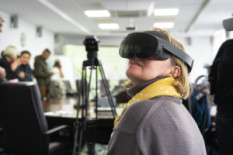In the latest column, with my colleague, Coach Anna Humenna, we gathered advice for Ukrainians with refugee status. These tips aid integration and can also help deal with various emotional issues. We discussed this in one of the podcast episodes, "Can it be this way?"
What to do when you have no energy or motivation?
It often happens to people with a lot of uncertainty in their lives or those who have entered a waiting mode. Waiting, for instance, for the war to end or to return home, and so on. On one hand, this is a natural reaction to abrupt changes, but this state consumes a lot of energy - it simply drains us. This mode is particularly harmful if it lasts for an extended period.
The first thing you can do in this situation is to try to define it. Of course, this is quite challenging in our circumstances, especially regarding long-term planning. Therefore, focusing on short-term planning is worthwhile - to develop a plan for the moment and your circumstances at a given time.
The first step is to accept the situation as it is. Then, start living in the new conditions, doing what is possible here and now. This is when you may find a specific goal. It's also important to understand what you can control in your current situation and what you cannot. Concentrate on what is within your sphere of influence, not wasting time on things beyond your control. This decision helps us reestablish our daily routine, which provides the energy to move forward. Afterward, understanding what to do next comes gradually.
You don't need to make final decisions immediately, about global issues like staying here or returning to Ukraine. You can start by living in the present day and postpone such choices until they become urgent.
Moreover, suppose you have absolutely no energy or motivation. In that case, start with something straightforward, with very small steps: a 5-minute morning exercise, a 10-minute walk during the day - that's already a good start. In general, sports and any physical activity give us energy. It's not about going to the gym or running long distances but doing a simple workout.
You can also read a few pages of a book, cook your favorite dish, or set aside your smartphone and listen to what's happening outside the window. Being in a safe country generally allows us to slow down and care for ourselves. Yes, we are here because of tragic events and a terrible war, but taking advantage of the opportunity to slow down and look after yourself is highly recommended.
However, if you have been feeling a lack of energy and motivation for a considerable period, even when doing something from the above, I suggest seeking professional help.
Another point is that if this state persists, it's worth looking into your physical health. You may need to get some tests done to understand where there may be a deficiency. When we experience significant stress, our iron levels may decrease, especially in women.
"I had a situation like that," Anna shared. "It turned out that I had deficient iron levels. The medical worker looked at me with amazement and couldn't understand how I was still sitting in front of her and moving with such low levels."
So, a prolonged feeling of low energy can have clear reasons that can be corrected simply by taking vitamins and minerals.
 What should a person do when they don't know where to start and where to move?
What should a person do when they don't know where to start and where to move?
To begin with, take an inventory of your skills. Reflect on your entire life and recall what you have done, what your professional activities were, what hobbies you pursued, what you studied, and so on. By creating such a list, you may find something that inspires you.
We also suggest looking back into your childhood and remembering what you enjoyed doing. There, you might discover many interesting things that can also inspire you. Additionally, a good approach is to think about things you would do for free, things you enjoy so much that you wouldn't need to be paid for. Starting such activities can bring you energy, understanding, and a vision of what to do next.
Don't be afraid to change your profession. Nowadays, we live in times where a person can have several successful careers. You don't need to cling to everything you did in your previous life with all your might. Analyze your current profession - will it be required in a few years? It may be time to change it significantly when your circumstances and opportunities have changed.
"I want to add that I recently changed my profession," Anna said. "I conducted an analysis and realized I needed to enter IT because I believe it has a future. But I had no idea how to do it or where to start. I only knew that I didn't want to be a programmer or something like that. At some point, I realized that in IT, there are roles like Agile Coach and Scrum Master, professions where I could use my coaching skills. So, I enrolled in Agile Coach training. Although I never made it into IT, I have the necessary certificate and use all the knowledge and skills I gained."
It's important to emphasize that you shouldn't be afraid that you won't like something new or won't succeed in that direction. These attempts are about personal development. Moreover, if you can't decide, consulting a coach is a good idea. A qualified specialist can help you find a development direction, highlight things, and provide guidance.
How do coaches (not) help?
Coaches don't provide specific advice on what to do in life, they don't formulate business ideas that will bring in income, and they don't have a magic pill that will instantly make you successful. The task of such a professional is to "illuminate" your path with questions, provide examples, suggest practices, and help you find what you want, see what you already have but might have overlooked or been afraid to look at.
What if it's scary to take the first steps into something new?
You should go where it's scary because that's where our growth is. Try, let's say, to negotiate with yourself because you can't fight fear since that only leads to losses. But you can negotiate with fear. Fear is our basic instinct passed down from our ancestors, which helped in potential threats. You cannot eradicate this emotion; it should be felt, understood, and listened to.
Ask yourself questions like:
- Why do I feel fear?
- What might happen if I do this?
- What am I terrified of?
Create a plan A. Then, think about possible obstacles and create a plan B if everything doesn't go as planned. Even at this level, you can feel the fear level decreasing. It continuously decreases when we know what to do.
Fear comes from uncertainty and not knowing what awaits us in the future. But as soon as we create little schemes and have plans, it no longer feels as scary.
Starting with small steps is a good idea when you're scared. Divide the first steps into something tiny, record them as separate points, and check them off as you complete them. It significantly reduces anxiety. I recommend writing a step-by-step plan with timings. Don't just think about it; write it down clearly. When you see your dream written on paper, along with deadlines, it's easier to start working on it.
We hope our advice will help Ukrainians cope with some emotional problems, make the right decisions, and move forward despite all the challenges.







